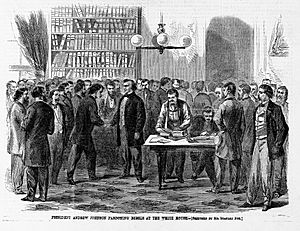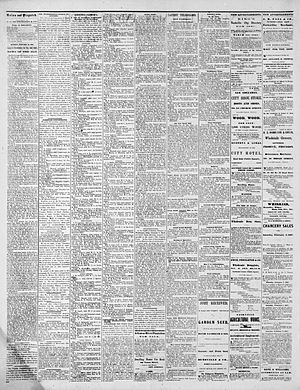Pardons for ex-Confederates facts for kids
During and after the American Civil War, US Presidents Abraham Lincoln and Andrew Johnson offered special forgiveness, called "pardons," to former Confederates. These pardons were usually given to military officers above the rank of colonel or to civilians who had held important political positions in the Confederate government. The power to grant pardons is given to the President in the US Constitution, specifically in Article II.
President Lincoln's Pardons
On December 8, 1863, President Lincoln shared his plans for rebuilding the South after the war. This plan included a way for former Confederates to receive amnesty, which is like a general pardon. To get a pardon, a person had to promise loyalty to the United States.
However, this pardon would not give back enslaved people or property that had been taken by the government and given to someone else. It also did not include Confederate government officials or anyone who had treated prisoners badly.
The Congress thought Lincoln's plan was too easy on the former Confederates. They refused to accept representatives from the rebuilt governments of Louisiana and Arkansas. Instead, Congress passed the Wade–Davis Bill. This bill required half of a former Confederate state's voters to swear loyalty to the US and also promise they had not supported the Confederacy. The bill also ended slavery but did not allow formerly enslaved people to vote. President Lincoln did not sign this bill.
During his time as president, Lincoln issued 64 pardons for actions related to the war. Most of these were for conspiracy, treason, or rebellion.
When the Army of Northern Virginia surrendered at Appomattox Court House on April 10, 1865, General Ulysses S. Grant made a special agreement. He said that each Confederate officer and soldier could go home. They would not be bothered by US authorities as long as they kept their promise to obey the law. This promise was called a "parole."
By May 5, this parole was extended to soldiers from the 11 Confederate states and West Virginia. However, those who lived in the District of Columbia or in states that never left the Union (like Maryland, Kentucky, and Missouri) had to follow Lincoln's earlier amnesty rules and get special permission to return home.
President Johnson's Pardons
When Andrew Johnson became president after Lincoln's death, he first seemed very strict with Confederate leaders. Many Southern leaders even left the United States, going to places like Mexico, Canada, and Europe. Johnson made the rules for who could not get a general pardon even tougher than Lincoln's. For example, his proclamation on May 29, 1865, did not include anyone whose personal property was worth more than $20,000.
However, Johnson later became more forgiving. This was partly because Lincoln had wanted reconciliation, and Johnson's Secretary of State, William H. Seward, also favored leniency.
People who were excluded from the general amnesty could ask the president directly for a special pardon. President Johnson spent a lot of his time granting these individual pardons.
Johnson's 1865 proclamation required a special oath from those seeking a pardon:
I, _____, do solemnly swear or affirm, in presence of Almighty God, that I will henceforth faithfully support and defend the Constitution of the United States and the Union of the States thereunder. And that I will, in like manner, abide by and faithfully support all laws and proclamations which have been made during the existing rebellion with reference to the emancipation of slaves, so help me God.
There were certain groups of people who were not allowed to receive the general pardon. These included high-ranking Confederate civil or military officers, people who had left US government jobs to join the rebellion, and those who had mistreated prisoners of war. Also, anyone who had property worth over $20,000 and had willingly participated in the rebellion was excluded. However, these people could still apply for a special pardon directly from the President.
By June 5, 1866, Johnson had issued 12,652 pardons. Most of these pardons went to people from Virginia, Alabama, and Georgia.
On January 9, 1867, President Johnson sent Congress a list of important former Confederates he had pardoned. A newspaper, the Nashville Telegraph and Union, published some of these names.
In a final announcement on December 25, 1868, Johnson declared a full pardon and amnesty for almost everyone who had committed treason against the United States during the Civil War. This restored all their rights and privileges under the Constitution and laws.
 | Toni Morrison |
 | Barack Obama |
 | Martin Luther King Jr. |
 | Ralph Bunche |



